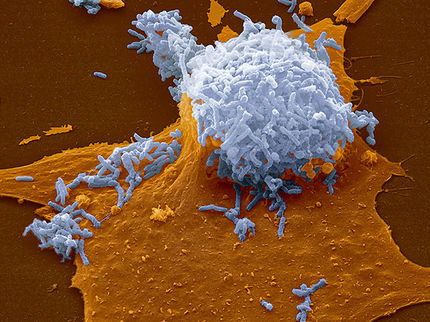McMaster researchers discover new mode of how diseases evolve
A new way that bacteria evolve into something that can make you sick
Advertisement
Researchers of the Michael G. DeGroote Institute for Infectious Disease Research have discovered a new way that bacteria evolve into something that can make you sick. The finding, published in Proceedings of the National Academy of Sciences , has implications for how scientists identify and assign risk to emerging diseases in the environment.
The researchers found that bacteria can develop into illness-causing pathogens by rewiring regulatory DNA, the genetic material that controls disease-causing genes in a body. Previously, disease evolution was thought to occur mainly through the addition or deletion of genes.
Brian Coombes, an assistant professor in the Department of Biochemistry and Biomedical Sciences, was the lead investigator of the study which involved researchers at McMaster University, the University of Melbourne, Australia and the University of Illinois at Chicago, USA.
"Bacterial cells contain about 5,000 different genes, but only a fraction of them are used at any given time," Coombes said. "The difference between being able to cause disease, or not cause disease, lies in where, when and what genes in this collection are turned on. We've discovered how bacteria evolve to turn on just the right combination of genes in order to cause disease in a host. It's similar to playing a musical instrument – you have to play the right keys in the right order to make music."
With infectious diseases on the rise, the McMaster finding has implications on how new pathogens are identified in the environment. Scientists currently monitor the risk of new diseases by assessing the gene content of bacteria found in water, food and animals.
"This opens up significant new challenges for us as we move forward with this idea of assigning risk to new pathogens," Coombes said. "Because now, we know it's not just gene content – it is gene content plus regulation of those genes."
Topics
Organizations
Other news from the department science

Get the life science industry in your inbox
By submitting this form you agree that LUMITOS AG will send you the newsletter(s) selected above by email. Your data will not be passed on to third parties. Your data will be stored and processed in accordance with our data protection regulations. LUMITOS may contact you by email for the purpose of advertising or market and opinion surveys. You can revoke your consent at any time without giving reasons to LUMITOS AG, Ernst-Augustin-Str. 2, 12489 Berlin, Germany or by e-mail at revoke@lumitos.com with effect for the future. In addition, each email contains a link to unsubscribe from the corresponding newsletter.

























































